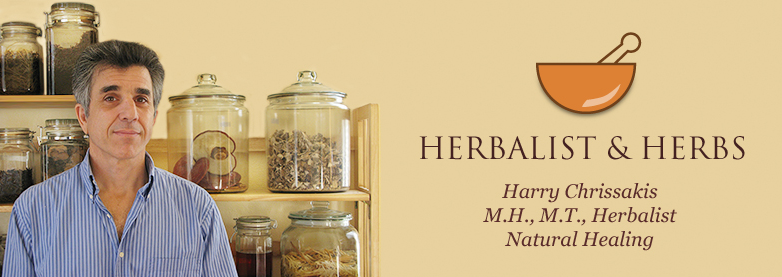HERBS TO CALM AND SOOTHE by Harry Chrissakis Herbalist, M.H. Natural Healing
HERBALIST AND HERBS
There are two applications of this idea.
One is to help with sub-clinical states of anxiety,
depression and the basic hebe-geebe’s we somehow
get into. Herbs alone will not help clinical manifestations
of these same disorders. They are simply not
strong enough. You can wrap herbal medicine around
meds but you cannot replace them.
The second application is to help people to sleep.
They may be the same herb with different dosage and
different frequency or a completely different plant
that approaches the same problem from a different
direction.
Lets watch a short introductory video:
The following list is by no means complete. They are
some of the plants that I have a lot of experience with.
Lets start with the gentler material.
CHAMOMILE.
Fresh flower extract is far superior to
dried plant. Although it may be viewed as something
almost non-existent it is a substantial herbal medicine
as a fresh plant extract. Chamomile helps relax and
organize the myenteric plexus, a group of nerves that
have a lot to do with the upper gastrointestinal function.
It both relaxes the stomach and duodenum, acts
as an anti-inflammatory and anti-spasmodic as well as
a good anti-bacterial. Good for people who stress out
in their gut which also begins to affect their head.
Keeps their mind kind of inflamed and hyperactive.
This stuff works well generally and will not remove
the alertness they need to function with throughout
the day.
LEMON BALM.
Another underrated herb and another
plant as a fresh extract that is far superior to its
dried counterpart. Lemon balm has some sort of
calming energetic action on the heart.
In Chinese they have something called “shen” which is
like the spirit of the heart. It calms and stabilizes that
energy. Chinese saying is “the heart houses the mind.”
So it also effects our mind indirectly through the heart.
Calming and soothing. By the way chamomile and
lemon balm are good for kids. gentle and effective.
ST JOHN’S WORT.
A local indigenous plant, overrated
for it’s effect on depression but it will help some
people with the blues. Again not clinical stuff. It helps
lighten the weight and takes some of the edge off
repetitive depressive thoughts. It also helps take some
of the edge off hyper states. Fresh plant is way better
than dried. Now for three herbs that are a little heavier
in their action, having more of an effect on the
central nervous system.
VALERIAN (of course)
As a fresh plant extract.
Dried plant works well also but tends to push the liver
a little; producing extra heat there, which is generally
not useful. Also, dried plant has more of a tendency to
produce morning drowsiness, like a mild hangover or
something. Fresh plant is a gentle and effective sedative
generally producing sleep within ½ hour of ingestion.
Nothing dramatic. No knock out, just a gentle drift into
sleep. It can be taken in low doses throughout the day
for people who are really stressed out and are very contracted
and tight in their musculature.
PASSION FLOWER.
The variety used is passiflora
incarnata. There are lots of passionflowers. Sorry to be
repetitive but fresh flower extract is where its at. Dried
does not cut it. This is another herb that is relatively
strong. A good sedative and analgesic (stops pain). It
affects the central nervous system. This herb will
extend the REM stage of sleep giving a deeper rest.
Some people do react with a mild morning hangover.
Generally speaking it works well. Passionflower is an
excellent anti-anxiety agent taken in small dosages
throughout the day. Again it is something that helps
take the edge off these states.
CALIFORNIA POPPY.
The one you see growing all
over is an excellent anti-anxiety agent. And, no, it
does not contain any opiates although its chemistry is
complex like many of these plants. In larger doses this
is a good sleeping aid and analgesic. Again, fresh plant
is the standard.
So, as I said this is a short list, but still a useful one.
Harry Chrissakis Herbalist, M.H. Natural Healing
